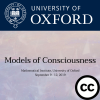Mauro D’Ariano - Awareness: an operational theoretical approach
Mauro D’Ariano
Dipartimento di Fisica, Università degli Studi di Pavia
I will explore the possibility of drawing definite theoretical assertions about “awareness”, including possible experimental falsification. Awareness will be regarded as a manifestation of a special kind of “information”, and, as such, formalised as an operational probabilistic theory (OPT) [1]. Awareness would correspond to “the feeling of the process” experienced by the OPT-systems involved in the process.
As a kind of information “awareness” is special in being “private”. Assuming
that such privacy is an in-principle one implies a number of interesting consequences. For example, according to a theorem about information privacy in OPTs [2], investigation will be restricted to OPTs that are essentially non classical, among which the most relevant instance is the quantum theory.
After presenting the OPT framework, assessing its methodological robustness in separating objective from theoretical elements, and examining postulates guaranteeing experimental control and falsifiability, I will compare postulates of relevant OPTs, and provide mathematical definitions of notions as holism, causality, complementarity, purification, and information privacy.
Finally, I will explore the hypothesis of “awareness as quantum coherence”, providing a list of motivations and consequences, and discussing the possibility of experimental tests in cognitive sciences, including the evaluation of the number of qubits involved in the awareness, the existence of complementary observables, and violations of local-realism bounds.
[1] G. M. D’Ariano, G. Chiribella, and P. Perinotti, “Quantum Theory from First Principles: An Informational Approach” (Cambridge University Press 2017)
[2] G. M. D’Ariano, P. Perinotti, A. Tosini, “Information and disturbance in operational probabilistic theories”, unpublished
Filmed at the Models of Consciousness conference, University of Oxford, September 2019.




